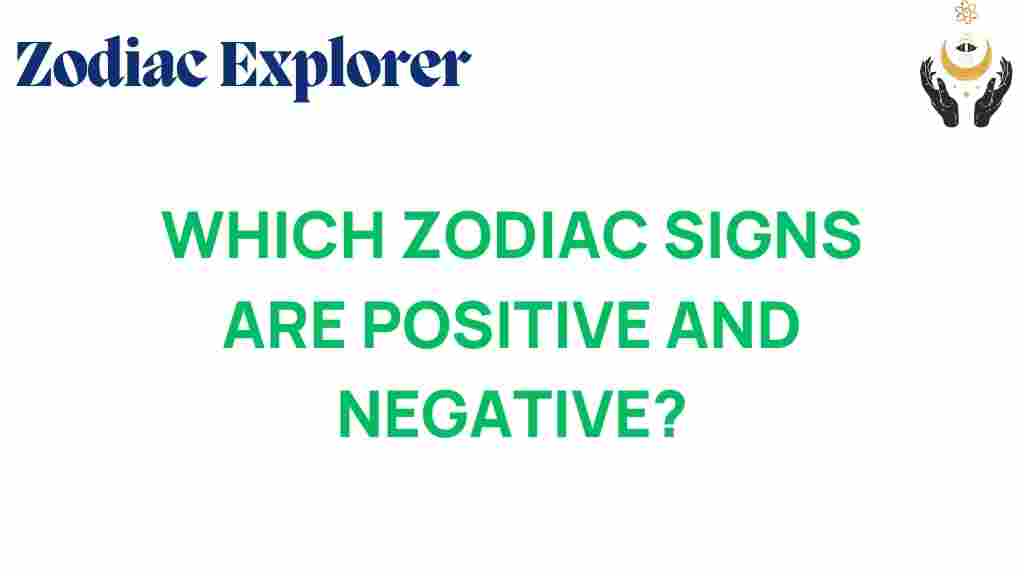Unveiling the Dual Nature of Zodiac Signs: Who’s Positive and Negative?
Astrology has fascinated humanity for centuries, providing insights into our personality traits through the lens of celestial influence. Each zodiac sign has its unique characteristics, encompassing both positive and negative traits. In this article, we will explore the dual nature of zodiac signs, shedding light on the various personality traits associated with each sign and how they can impact our lives.
Understanding Zodiac Signs
Zodiac signs are divided into twelve distinct categories, each representing a segment of the celestial sphere. Astrologers believe that the positions of celestial bodies at the time of our birth influence our personality traits, behavior, and even our fate. The twelve zodiac signs are:
- Aries (March 21 – April 19)
- Taurus (April 20 – May 20)
- Gemini (May 21 – June 20)
- Cancer (June 21 – July 22)
- Leo (July 23 – August 22)
- Virgo (August 23 – September 22)
- Libra (September 23 – October 22)
- Scorpio (October 23 – November 21)
- Sagittarius (November 22 – December 21)
- Capricorn (December 22 – January 19)
- Aquarius (January 20 – February 18)
- Pisces (February 19 – March 20)
Positive Traits of Zodiac Signs
Every zodiac sign carries inherent positive traits that can be seen as strengths. Here’s a closer look at the positive attributes associated with each sign:
- Aries: Courageous, determined, and confident.
- Taurus: Reliable, patient, and practical.
- Gemini: Adaptable, outgoing, and intelligent.
- Cancer: Compassionate, nurturing, and protective.
- Leo: Charismatic, generous, and enthusiastic.
- Virgo: Analytical, meticulous, and helpful.
- Libra: Diplomatic, charming, and fair-minded.
- Scorpio: Passionate, resourceful, and intuitive.
- Sagittarius: Adventurous, optimistic, and open-minded.
- Capricorn: Disciplined, responsible, and ambitious.
- Aquarius: Innovative, friendly, and humanitarian.
- Pisces: Artistic, empathetic, and wise.
Negative Traits of Zodiac Signs
Alongside their positive traits, zodiac signs also exhibit negative characteristics that can hinder personal growth. Understanding these traits is essential for a complete character analysis:
- Aries: Impulsive, aggressive, and impatient.
- Taurus: Stubborn, possessive, and materialistic.
- Gemini: Indecisive, anxious, and inconsistent.
- Cancer: Moody, sensitive, and insecure.
- Leo: Arrogant, attention-seeking, and stubborn.
- Virgo: Overcritical, perfectionist, and anxious.
- Libra: Indecisive, self-pitying, and superficial.
- Scorpio: Jealous, secretive, and manipulative.
- Sagittarius: Impulsive, tactless, and irresponsible.
- Capricorn: Pessimistic, workaholic, and unforgiving.
- Aquarius: Detached, unpredictable, and aloof.
- Pisces: Escapist, overly trusting, and fearful.
The Celestial Influence on Personality Traits
The celestial influence plays a crucial role in shaping our personality traits. Astrologers believe that the alignment of planets during our birth can contribute to our strengths and weaknesses. For instance, individuals born under fire signs (Aries, Leo, Sagittarius) are often seen as energetic and passionate, while those under earth signs (Taurus, Virgo, Capricorn) tend to be more grounded and practical.
Understanding the characteristics associated with each sign can help individuals navigate their relationships, career choices, and personal growth. Many people turn to horoscopes to gain insights into their daily lives, making astrology a popular tool for self-discovery.
Step-by-Step Process for Self-Discovery Through Zodiac Signs
Here’s a step-by-step guide to using zodiac signs for personal growth and self-discovery:
- Identify Your Zodiac Sign: Determine your zodiac sign based on your birth date.
- Research Your Sign: Explore the positive and negative traits associated with your sign.
- Reflect on Your Traits: Consider how these traits manifest in your life, relationships, and career.
- Set Goals: Based on your reflection, set personal development goals to enhance your positive traits and mitigate the negative ones.
- Practice Self-Awareness: Regularly check in with yourself to see how well you are aligning with your goals.
- Seek Guidance: Consult horoscopes or an astrologer for further insights and guidance on your journey.
Troubleshooting Common Issues in Zodiac Understanding
While exploring zodiac signs can be enlightening, individuals may encounter challenges. Here are some common issues and their solutions:
- Confusion About Traits: If you feel conflicted about your traits, remember that every sign has a mix of characteristics. Engage in self-reflection to better understand your unique blend.
- Overemphasis on Negative Traits: Focus on your strengths and how you can better utilize them. Seek constructive ways to address negative traits without dwelling on them.
- Misinterpretation of Horoscopes: Horoscopes are general and should be taken as guidance rather than absolute predictions. Approach them with an open mind.
For more detailed horoscopes and zodiac characteristics, you can visit Astrology.com.
Conclusion
Understanding the dual nature of zodiac signs—both positive and negative traits—can provide valuable insights into ourselves and those around us. By recognizing the celestial influence on our personality traits, we can harness our strengths and work on our weaknesses. Whether you’re a fiery Aries or a dreamy Pisces, embracing the full spectrum of your zodiac characteristics can lead to a deeper understanding of your character.
As you embark on this journey of self-discovery, remember that astrology is a tool for growth. By reflecting on your traits and setting goals, you can turn the insights gained from your zodiac sign into meaningful change in your life.
Explore more about your zodiac signs, and let the stars guide you on your personal journey!
This article is in the category Signs and created by ZodiacExplorer Team
